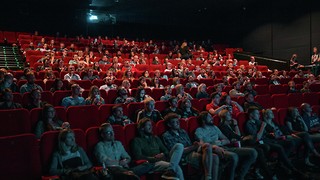Coriolanus: Q+A with director Ralph Fiennes
Alice Bolland admires Ralph Fienne’s work as both director and leading role in the latest screen adaptation of the Bard

The Cambridge Arts Picturehouse was thrilled to welcome veteran film and stage actor-turned-director Ralph Fiennes last weekend, following a preview of his new release Coriolanus. The turnout was impressive, with the tickets for the event allegedly selling out in a record time of 6 hours. And the crowd was not disappointed. The film, lasting just over 2 hours, closed with raucous applause from the audience, who immediately began firing questions at the surprisingly laid-back Fiennes.
The film is based on Shakespeare’s tragedy, which documents the struggles of the eponymous Roman leader as he deals, somewhat contemptuously, with the rioting plebs of Rome. Fiennes’s adaptation of the play is the most recent in a longstanding tradition of modern-day takes on Shakespearean tales; it immediately draws to mind Baz Luhrmann’s successful adaptation of Romeo and Juliet in 1996, which has strong stylistic similarities.
Whilst Fiennes is unerringly faithful to the original, himself declaring a particular love for the bard’s work, it is an ambitious task for a first-time director, especially considering his choice of text. Hardly one of Shakespeare’s most loved plays, the story seems antiquated, often jarring with the modern context Fiennes has attempted to fit it into.

But perhaps this is just a personal quibble: Fiennes admits that it “has a reputation for being a very difficult text”, but argues that the story is a particularly pertinent one. “I quickly felt it should be set today – not futuristic, not 30 years ago, it had to be today. We’ve all lived through this conflict; it’s the conflict that never ends. We’re always killing each other somewhere.” Clearly for Fiennes the play has a very profound resonance. He speaks of the central themes of the play – “continual warfare, political manipulation, economic uncertainty” – as being ever relevant, thus explaining his selection.
In terms of cinematography, the production is almost faultless. Primarily filmed in the Balkans, the setting is necessarily harsh and black, augmenting the atmosphere of disillusion and chaos. Special credit must go to the team behind the sound and music of the film. Indeed, Fiennes was particularly proud of this aspect. As he says “I usually resist, or feel wary, when I’m told musically what to feel in a film. I resisted anything that felt it was going to tell you how you should be feeling.” True to his word, the use of sound throughout is kept to a minimum, allowing the audience to focus more directly upon the complex language and character interaction.
The acting, too, is superb. The central relationship between Coriolanus (played by Fiennes himself) and his mother Volumnia (Vanessa Redgrave in a staggering performance) is depicted perfectly. When asked what most appealed to him about the play, it is this relationship which he feels fundamentally underpins the action. He recognises the emotional importance of such a relationship within the film, mentioning what he refers to as “the umbilical moment” at the end of the film. “We have all come from mothers. We all had an umbilical cord. No-one in this room has escaped that.”His comments illustrate the universal appeal he feels the play offers.
For all its positives in production terms though, this film remains an acquired taste. For die-hard Shakespeare fans, it is an interesting take on a tricky text. But for those of us less committed, it may feel a little stilted.
 News / Tompkins Table 2025: Trinity widens gap on Christ’s19 August 2025
News / Tompkins Table 2025: Trinity widens gap on Christ’s19 August 2025 Comment / A plague on your new-build houses18 August 2025
Comment / A plague on your new-build houses18 August 2025 News / Pro-Palestine activists spray-paint Barclays Eagle Labs18 August 2025
News / Pro-Palestine activists spray-paint Barclays Eagle Labs18 August 2025 News / Trinity sells O2 Arena lease for £90m12 August 2025
News / Trinity sells O2 Arena lease for £90m12 August 2025 Arts / Shame on you for art-shaming me!19 August 2025
Arts / Shame on you for art-shaming me!19 August 2025









